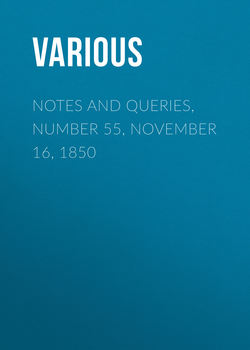Читать книгу Notes and Queries, Number 55, November 16, 1850 - Various - Страница 2
NOTES
ON AUTHORS AND BOOKS, NO. IX
ОглавлениеEustache Deschamps. Except in the two centuries next after the conquest, contemporaneous French notices of early English writers seem to be of rather infrequent occurrence.
On this account, and on other accounts, the ballad addressed to Geoffrey Chaucer by Eustache Deschamps deserves repetition. Its text requires to be established, in order that we may be aware of its real obscurities—for no future memoir of Chaucer can be considered as complete, without some reference to it.
The best authorities on Eustache Deschamps are MM. Crapelet, Raynouard, and Paulin Paris. To M. Crapelet we are indebted for the publication of Poésies morales et historiques d'Eustache Deschamps; to M. Raynouard, for an able review of the volume in the Journal des Savants; and to M. Paulin Paris, for an account of the manuscript in which the numerous productions of the author are preserved. Of the author himself, the learned M. Paris thus writes:—
"On pourroit surnommer Eustache Deschamps le Rutebeuf du XIVe siècle.—Ses oeuvres comprennent des épitres, des discours en prose, des jeux dramatiques, des ouvrages latins, des apologues, un grand poème moral, et un infinité de ballades et rondeaux pieux, bouffons, satiriques," &c.
Two impressions of the ballad in question are before me; one, in the Life of Geoffrey Chaucer by sir Harris Nicholas, dated 1843—and the other in a volume entitled Geoffrey Chaucer, poète anglais du XIVe siècle. Analyses et Fragments par H. Gomont, Paris, 1847.—I transcribe the ballad from the latter volume, as less accessible to English students:—
"BALLADE INÉDITE ADRESSÉE A GEOFFREY CHAUCER PAR EUSTACHE DESCHAMPS
O Socrates, plains de philosophie,
Senèque en meurs et Anglais en pratique,
Ouï des grans en ta poëterie,
Bries en parler, saiges en rethorique,
Virgiles tres haulz qui, par ta théorique,
Enlumines le règne d'Eneas,
Lisle aux geans, ceuls du Bruth, et qui as
Semé les fleurs et planté le rosier,
Aux ignorants, de la langue pandras
Grant translateur, noble Geffroy Chaucier.
Tu es d'amours mondains Dieux en Albie,
Et de la rose en la terre angélique,
Qui d'Angela Saxonne et (est) puis flourie
Angleterre (d'elle ce nom s'applique).
Le derrenier en l'éthimologique
En bon anglès le livre translatas;
Et un Vergier, où du plant demandas
De ceuls qui sont pour eulx auctorisier,
A ja long teams que tu édifias,
Grant tranlslateur noble Geffroy Chaucier.
A toy, pour ce, de la fontaine Helye
Requier avoir un buvraige autentique
Dont la doys est du tout en ta baillie,
Pour rafrener d'elle ma soif éthique
Qui men gaule seray paralitique
Jusques à ce que tu m'abuveras.
Eustaces sui qui de mon plant aras;
Mais pran en gre les euvres d'escolier
Que par Clifford de moy Bavoir pourras,
Grant translateur noble Geffroy Chaucier.
L'ENVOY
Poëte hauls loenge destynie
En ton jardin ne seroie qu'ortie
Considere ce que j'ai dit premier
Ton noble plant, ta douce melodie
Mais pour savoir de rescripre te prie,
Grant translateur noble Geoffroy Chaucier."
The new readings are in Italics, and I shall now repeat them with the corresponding words as printed by sir Harris Nicolas:—
"Anglais=angles; Ouï des grans=Ovides grans; Virgiles=Aigles; d'Angela=dangels; sont=font; A ja=N'a pas; buvraige=ouvrage; rafrener=rafrecir; soif=soix; Qui men=Qu'en ma; En=Et."
After such an exhibition of various readings, arising out of only two copies of the same manuscript, it is evident that a re-collation of it is very desirable, and I am sure the result would be thankfully received by the numerous admirers of Chaucer.
BOLTON CORNEY.
Eustache Deschamps (Vol. ii., p. 376.).—J.M.B. is desirous of learning some particulars of this French poet, contemporaneous with Chaucer. He will find a brief notice of him in the Recueil de Chants Historiques Français, depuis le XIIème jusqu'au XVIIIème Siècle, by Le Roux de Lincy (2 vols. Paris, 1841, Libraire de Charles Espelin). He is there described as,
"Ecuyer et huissier d'armes des rois Charles V. et Charles VI., qui resta toujours fidèle à la maison de France;"
And the editor adds:
"Les œuvres d'Eustache Deschamps contiennent pour l'histoire du XIVème siècle des renseignemens précieux; on peut y recueillir des faits politiques qui ne sont pas sans importance, mais on y trouve en plus grand nombre des détails précieux sur les mœurs, les usages, et les coutumes de cette époque."
His poems were published for the first time in one vol. 8vo., in 1832, by M. Crapelet, with this title:
"Poésies morales et historiques d'Eustache Deschamps, écuyer, huissier d'armes des rois Charles V. et Charles VI., chatelain de Fismes et bailli de Senlis."
As regards the "genuineness" of the poem cited, I am inclined, with J.M.B., to think that it admits of question, the orthography savouring more of the end of the fifteenth than of the close of the fourteenth century. I am sorry not to be able to explain the meaning of "la langue Pandras."
D.C.
